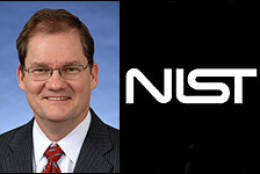National Institute of Standards and Technology
-
The Postal Service issued a draft solicitation for the Federal Cloud Credential Exchange. The goal is to create a cloud-based service to perform identity authentication and verification. Agencies could plug into the service, integrating it with any application that adheres to the standards.
January 11, 2013 -
IT Lab Director Charles Romine said the organization collaborates with an ever-growing number of agencies on technology challenges. He said the Lab also is focusing on questions around cloud, cybersecurity, mobile computing and big data. January 10, 2013
January 10, 2013 -
Dr. A. Hunter Fanney talks about a house the NIST Engineering Lab is using to study green technologies. Dr. Cheryl Martin discusses the Energy Department's recent round of grants to foster new technology. Financial Planner Arthur Stein discusses the impact of FERS over the last 25 years. Pete Kasperowicz of The Hill newspapers reviews upcoming legislation on Capitol Hill.
December 12, 2012 -
The mobile revolution isn't new to many agencies. Laptops and BlackBerrys have been standard issue for many government executives for the last decade. What is different, however, is the widespread use of smartphones and tablet computers. Both agencies and citizens hold new and more immediate expectations because of these devices, and the government must adapt to this technololgy. In our special report, Gov 3.0: It's Mobile, Federal News Radio explores how some agencies are meeting the demand internally and externally for mobile devices and apps. The challenge, like any new technology, is ensuring these devices actually help meet mission goals and don't become just another shiny toy.
December 07, 2012 -
OMB Controller Danny Werfel explains how agencies have been able to cut improper payments. Also, the VA's Mary Santiago discusses the hurdles to hiring more veterans into the federal workforce.
November 29, 2012 -
Sen. Mark Warner (D-Va.) describes the bipartisan support around the DATA Act. Michael Courts of the GAO recaps his testimony on diplomatic security related to the attack on the U.S. consulate in Benghazi. Charles H. Romine of NIST explains how medical professionals can make meaningful use of electronic records.
November 20, 2012 -
Identity management, standup of Cyber Command, and information sharing with the industrial base have been cited as key cyber accomplishments in the Department of Defense. But much work remains, experts say.
October 25, 2012 -
Federal News Radio polled current and former federal cybersecurity experts for their opinions on what were the most significant cybersecurity accomplishments since 2006 to secure federal networks and improve public- private partnerships. The accomplishments are in no particular order.
October 23, 2012 -
Nobel Prize winner David Wineland of NIST discusses his accomplishments. And a contingent of large federal buildings might be getting a makeover. The National Capital Planning Commission shares plans the GSA is considering.
October 12, 2012 -
White House senior director for cybersecurity Andy Ozment said budget folks are getting a better understanding of why cybersecurity is important thanks to the administration's high- priority governmentwide goals. NIST also is helping push the cross-agency goals forward from a technical perspective.
October 12, 2012 -
More than eight years after the White House issued Homeland Security Presidential Directive-12 requiring the issuance of secure identity cards, governmentwide and agency-specific initiatives provide hope the smart cards can be more than "glorified ID cards." NIST and GSA are developing an identity exchange in the cloud. DHS and IRS are putting their cards to use at a local level for both building and computer access.
October 11, 2012 -
John Kasianowicz is the NIST project leader on a project coming up with a cheaper way to test DNA for possible illnesses. GAO's John Hutton says that few agencies are compiling inventories for their service contracts. Procurement attorney Joe Petrillo discusses a new inspector general's report. Dr. Harry Lambright of Syracuse University studied the effectiveness of two former federal officials. David Hall-Matthews talks about a ranking of nonprofits.
October 09, 2012 -
Agencies and universities are refining job descriptions, revamping training and education programs and helping industry, academia and government to begin to reach consensus on the makeup of a modern-day cybersecurity workforce. The Office of Personnel Management also has made changes to personnel systems so that job descriptions map to the framework. The plan already has had in impact on cyber education at colleges and universities across the country.
October 08, 2012 -
A number of agencies have made high-profile migrations to cloud platforms and the Obama administration has issued sweeping guidance mandating agencies identify and transition services and applications to host in the cloud. For a look at how agencies are faring in their shifts to the cloud and the issues they continue to face, the Federal Drive with Tom Temin and Emily Kopp hosted a panel discussion, "Clearing the Fog Around Cloud Computing," sponsored by Level 3 Communications.
September 28, 2012 -
The agency plans to release solicitations to help agencies implement sensors to detect threats, followed by industry-provided services to analyze them. Congress approved $183 million to begin in 2013 to help get continuous monitoring off the ground more quickly.
September 28, 2012



